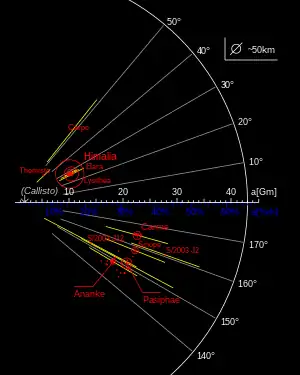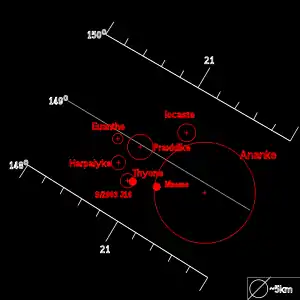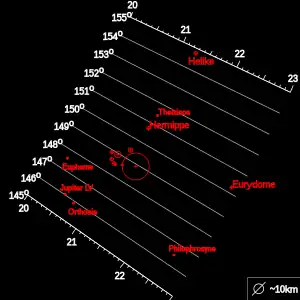
The Ananke group is a group of retrograde irregular satellites of Jupiter that follow similar orbits to Ananke and are thought to have a common origin.
Their semi-major axes (distances from Jupiter) range between 19.2 and 21.8 Gm, their orbital inclinations between 144.3° and 155.5°, and their orbital eccentricities between 0.09 and 0.30.
The core members include:[1][2]
| Name | Diameter (km) | Period (days)[lower-alpha 1] |
|---|---|---|
| Ananke | 28 | −623.59[3] |
| Praxidike | 7 | −609.25[4] |
| Iocaste | 5 | −640.97[3] |
| Harpalyke | 4 | −634.19[3] |
| Thyone | 4 | −603.58[4] |
| Euanthe | 3 | −602.81[4] |
| Eupheme | 2 | −628.06[5] |
The International Astronomical Union (IAU) reserves names ending in -e for all retrograde moons, including this group's members.
Origin
The Ananke group is believed to have been formed when an asteroid was captured by Jupiter and subsequently fragmented by a collision. This belief is founded on the fact that the dispersion of the mean orbital parameters[lower-alpha 2] of the core members is very small and can be accounted for by a small velocity impulse (15 < δV < 80 m/s), compatible with a single collision and breakup.[6]
Based on the sizes of the satellites, the original asteroid may have been about 28 km in diameter. Since this value is near the approximate diameter of Ananke itself, it is likely the parent body was not heavily disrupted.[7]
Available photometric studies put this in doubt, however, and suggest that secular resonance has mixed the Ananke and Pasiphae groups: three of the moons of the former family (Harpalyke, Praxidike and Iocaste) display similar grey colours (average colour indices: B−V = 0.77 and V−R = 0.42) while Ananke itself is on the boundary between grey and light red.[8]


Notes
- ↑ Negative period is indicative of retrograde motion.
- ↑ Osculating orbital parameters of irregular satellites of Jupiter change widely in short intervals due to heavy perturbation by the Sun. For example, changes of as much as 1 Gm in semi-major axis in 2 years, 0.5 in eccentricity in 12 years, and as much as 5° in inclination in 24 years have been reported. Mean orbital elements are the averages calculated by the numerical integration of current elements over a long period of time, used to determine the dynamical families.
References
- ↑ Jewitt, David C.; Sheppard, Scott S.; Porco, Carolyn (2004). Bagenal, Fran; Dowling, Timothy E.; McKinnon, William B. (eds.). Jupiter. The planet, satellites, and magnetosphere (PDF). Jupiter's outer satellites and Trojans. Cambridge planetary science. Vol. 1. Cambridge, UK: Cambridge University Press. pp. 263–280. ISBN 0-521-81808-7. Archived from the original (PDF) on 2007-06-14.
- ↑ Nesvorný, David; Beaugé, Cristian; Dones, Luke (2004). "Collisional Origin of Families of Irregular Satellites". The Astronomical Journal. 127 (3): 1768–1783. Bibcode:2004AJ....127.1768N. doi:10.1086/382099. S2CID 27293848 – via IOP Publishing.
- 1 2 3 "M.P.C. 127087" (PDF). Minor Planet Circular. Minor Planet Center. 17 November 2020.
- 1 2 3 "M.P.C. 104798" (PDF). Minor Planet Circular. Minor Planet Center. 10 May 2017.
- ↑ "M.P.C. 106350" (PDF). Minor Planet Circular. Minor Planet Center. 10 May 2017.
- ↑ Nesvorný, David; Alvarellos, Jose L. A.; Dones, Luke; Levison, Harold F. (July 2003). "Orbital and Collisional Evolution of the Irregular Satellites" (PDF). The Astronomical Journal. 126 (1): 398–429. Bibcode:2003AJ....126..398N. doi:10.1086/375461. S2CID 8502734.
- ↑ Sheppard, Scott S.; Jewitt, David C. (May 5, 2003). "An abundant population of small irregular satellites around Jupiter" (PDF). Nature. 423 (6937): 261–263. Bibcode:2003Natur.423..261S. doi:10.1038/nature01584. PMID 12748634. S2CID 4424447. Archived from the original (PDF) on August 13, 2006.
- ↑ Grav, Tommy; Holman, Matthew J.; Gladman, Brett; Aksnes, Kaare (2003-01-02). "Photometric Survey of the Irregular Satellites". Icarus. 166 (1): 33–45. arXiv:astro-ph/0301016. Bibcode:2003Icar..166...33G. doi:10.1016/j.icarus.2003.07.005. S2CID 7793999.